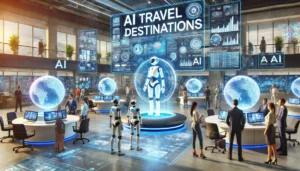How Travel Companies and Publishers are Using AI to Revolutionize the Industry
Artificial Intelligence (AI) is transforming the travel industry in unprecedented ways, enhancing the experience for travelers and streamlining operations for companies. From travel agencies and airlines to hotels and publishers, AI technologies are reshaping how services are delivered and consumed. Here’s a look at how AI is being used by travel companies and publishers today:
1. Personalized Customer Experiences
One of the most impactful uses of AI in the travel industry is the ability to deliver highly personalized experiences. AI algorithms analyze vast amounts of data, such as past bookings, travel preferences, and browsing behavior, to provide tailored recommendations for flights, accommodations, and activities. This level of personalization helps travel companies offer bespoke travel packages that cater to individual needs, enhancing customer satisfaction and loyalty.
2. Chatbots and Virtual Assistants
AI-powered chatbots and virtual assistants have become a staple for many travel companies, providing 24/7 customer service. These AI tools can handle a variety of tasks, from answering frequently asked questions to managing bookings and cancellations. They significantly reduce wait times and improve the overall customer experience by offering immediate assistance. Moreover, advanced chatbots can understand natural language, making interactions more seamless and human-like.
3. Predictive Analytics for Demand Forecasting
Travel companies use AI-driven predictive analytics to forecast demand and optimize pricing strategies. By analyzing historical data, booking patterns, and external factors like weather conditions and economic trends, AI models can accurately predict future demand. This helps companies adjust their pricing dynamically, maximizing revenue during peak times while offering competitive rates during low demand periods.
4. Enhanced Security and Fraud Detection
AI is playing a crucial role in enhancing security within the travel sector. Machine learning algorithms can identify suspicious activities, such as unusual booking patterns or payment anomalies, to detect and prevent fraud. For example, AI can flag transactions that deviate from a traveler’s usual behavior, prompting additional verification steps to ensure security.
5. Streamlining Operations with Automation
Automation is another significant benefit AI brings to the travel industry. From processing bookings to managing inventory and logistics, AI-powered automation reduces the need for manual intervention, leading to faster and more efficient operations. For instance, airlines and hotels use AI to automate check-in processes, luggage tracking, and even room service, freeing up staff to focus on more complex tasks that require a human touch.
6. Smart Recommendations and Travel Planning
AI helps travelers make informed decisions by providing smart recommendations based on their preferences and constraints. AI-driven platforms can suggest the best times to travel, alternative routes, and nearby attractions, enhancing the overall travel experience. By integrating AI with travel planning apps, companies can offer a more interactive and engaging way for customers to plan their trips.
7. Virtual Reality (VR) and Augmented Reality (AR) Tours
AI is also enhancing the pre-travel experience through VR and AR. Travel companies use these technologies to offer virtual tours of destinations, hotels, and attractions, allowing customers to explore their options before making a decision. This immersive experience helps travelers feel more confident in their choices, leading to higher booking conversion rates.
8. Optimizing Travel Routes and Itineraries
AI algorithms can optimize travel routes and itineraries by analyzing real-time data such as traffic conditions, weather forecasts, and flight schedules. This not only improves efficiency but also enhances the customer experience by minimizing delays and disruptions. For instance, AI can suggest alternative routes during traffic congestion or adjust itineraries in response to flight delays, ensuring a smoother travel journey.
9. Sustainability and Environmental Impact Reduction
Travel companies are leveraging AI to reduce their environmental impact by optimizing resource usage. AI can analyze energy consumption patterns, suggest eco-friendly alternatives, and help companies make more sustainable choices. For example, AI can optimize flight paths to reduce fuel consumption or recommend sustainable accommodations that align with a traveler’s values.
10. Hyper-Targeted Marketing Campaigns
AI enables travel companies to create hyper-targeted marketing campaigns by analyzing user data and identifying specific audience segments. This allows companies to deliver personalized ads and offers that resonate with individual customers, increasing the likelihood of conversion. AI-driven marketing tools can also track the effectiveness of campaigns in real-time, allowing for adjustments that enhance performance.
How Travel Publishers are Using AI
Travel publishers are also harnessing the power of AI to deliver more engaging and relevant content to their audiences. Here’s how AI is making an impact in travel publishing:
- Content Creation and Curation: AI is being used to automate the creation of content such as news articles, travel guides, and social media posts. Machine learning algorithms can curate content based on trending topics, audience preferences, and previous engagement metrics, ensuring that the most relevant information is presented to readers.
- Personalized Recommendations: Just like travel companies, publishers use AI to provide personalized content recommendations. By analyzing reader behavior and preferences, AI can suggest articles, videos, and other content that align with individual interests, keeping readers engaged and coming back for more.
- SEO Optimization: AI tools help publishers optimize their content for search engines by suggesting keywords, improving readability, and even predicting the content’s performance. This not only helps in driving more traffic but also ensures that the content reaches the right audience.
- Enhanced User Experience: AI-powered chatbots and virtual assistants on publisher websites help guide users through content, answer questions, and even recommend articles. This interactive experience keeps users engaged and enhances their overall experience on the site.
Prominent Travel Publishers Using AI
Here are some of the top travel publishers that are leveraging AI to enhance their content delivery and user experience:
- Breaking Travel News (www.breakingtravelnews.com)
Breaking Travel News uses AI to automate news aggregation and content curation, ensuring that readers have access to the latest travel news from around the world. They also employ AI analytics to better understand audience preferences and tailor their content accordingly. - Lonely Planet (www.lonelyplanet.com)
Lonely Planet utilizes AI for content recommendations and to personalize the user experience on their website. They use machine learning to analyze user data and suggest relevant travel guides, tips, and articles that match the user’s interests and past behavior. - Condé Nast Traveler (www.cntraveler.com)
Condé Nast Traveler employs AI to enhance their editorial strategy, from content creation to audience engagement. They use AI-powered tools for predictive analytics to understand content performance and make data-driven decisions on what to publish next. - Travel + Leisure (www.travelandleisure.com)
Travel + Leisure uses AI to improve content discovery on their platform, providing personalized recommendations based on user preferences. Their AI systems analyze reading patterns and content interactions to suggest articles that are most likely to resonate with individual readers. - Skift (www.skift.com)
Skift uses AI for data-driven journalism and trend analysis, offering in-depth reports and insights into the travel industry. Their AI tools help identify emerging trends by analyzing large volumes of data, enabling them to produce timely and relevant content for their audience.
Top 10 Companies in the Travel Industry Using AI
Here are the top 10 companies in the travel industry that are effectively using AI to enhance their services:
- Expedia Group (www.expedia.com)
Expedia uses AI for personalized travel recommendations and dynamic pricing models. Their AI algorithms analyze customer data to tailor search results, suggest destinations, and optimize booking options. - Booking.com (www.booking.com)
Booking.com employs AI to power its customer service chatbots, which assist with booking management, answering queries, and providing personalized recommendations. They also use machine learning to improve search results and pricing strategies. - Airbnb (www.airbnb.com)
Airbnb leverages AI to enhance its search and matching algorithms, ensuring travelers find the most relevant listings. They also use AI-driven insights to help hosts optimize pricing and occupancy rates. - Hilton Hotels (www.hilton.com)
Hilton uses AI for personalized guest experiences, including room customization options and virtual concierge services. They also utilize AI for predictive maintenance to ensure rooms are always in top condition. - TripAdvisor (www.tripadvisor.com)
TripAdvisor employs AI to provide personalized recommendations and content curation for users, such as reviews and activity suggestions based on previous searches and preferences. - KLM Royal Dutch Airlines (www.klm.com)
KLM uses AI-powered chatbots to assist customers with booking, check-in, and flight status updates. Their AI systems also help with operational efficiencies, like predictive maintenance for aircraft. - Skyscanner (www.skyscanner.com)
Skyscanner utilizes AI to provide fare predictions, suggesting the best times to book flights. They also use machine learning to improve the accuracy of search results and tailor offers to individual travelers. - Ryanair (www.ryanair.com)
Ryanair uses AI to optimize its pricing strategy through predictive analytics, ensuring competitive fares. They also use chatbots to enhance customer service by handling common inquiries and booking modifications. - Marriott International (www.marriott.com)
Marriott employs AI for predictive analytics to personalize guest experiences, from recommending amenities to optimizing room pricing. They also use AI to improve operational efficiency in areas like housekeeping and maintenance. - Delta Air Lines (www.delta.com)
Delta uses AI to enhance customer service through chatbots and virtual assistants. They also leverage AI for predictive maintenance of aircraft, ensuring safety and minimizing delays.
Conclusion
The integration of AI in the travel industry is revolutionizing how companies and publishers operate and interact with customers. From personalized experiences and improved security to operational efficiencies and engaging content, AI is helping travel companies and publishers navigate the complexities of the modern world. As AI technologies continue to evolve, we can expect even more innovative applications that will further enhance the travel experience for everyone involved.
Whether it’s through virtual assistants, predictive analytics, or immersive virtual tours, AI is paving the way for a smarter, more personalized, and efficient travel industry. As travel companies and publishers continue to embrace AI, they are not only meeting the growing expectations of modern travelers but also setting new standards for the future of travel.





